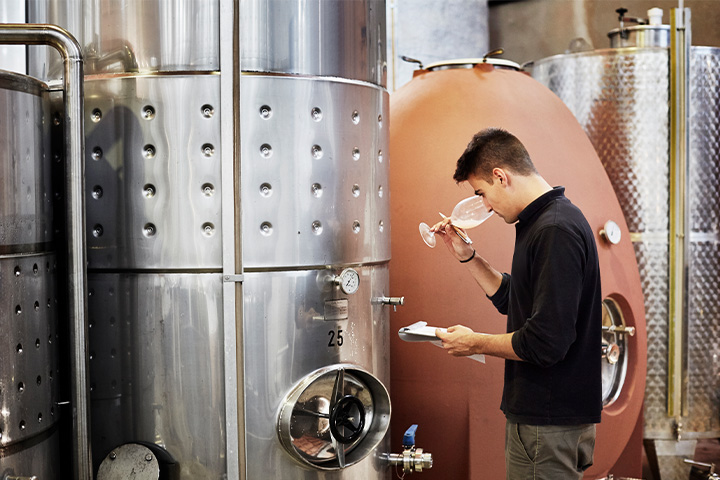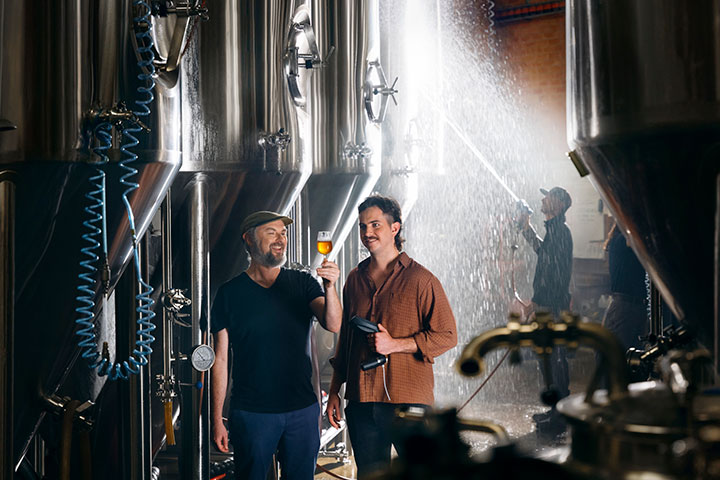Skip to main content![A young male vintner in a wine cellar, holding a glass and tasting his latest wine creation.]()

- Go to homepage
- About
- Media
- New year new hobby new brewing career
Back to:Media
Media release
TAFE NSW Ultimo | 13 January 2025

New year, new hobby, new brewing career
“To succeed in this industry, you need to have a passion for brewing.”
Richard Adamson
A barbecue sizzling, a cricket ball hitting wood, waves crashing on a beach, and a cold beer cracking open during the festive season are sounds synonymous with summer in Australia.
Food and beverage factory workers, such as brewery workers, are the fifth-largest employing occupation in Australia’s manufacturing industry. All occupations in the food trades workers group were on Australia’s 2023 Skills Priority List, and the Manufacturing Workforce Plan 2024 projects the manufacturing industry’s workforce will grow by almost 120,000 people in the 10 years to 2033.
A career as a brewer often starts by getting into homebrewing, and with the new year seeing people look to re-set and try new hobbies, the leap from homebrewer to professional brewer has become smaller thanks to TAFE NSW’s brewing courses.

Below, TAFE NSW brewing teacher and Young Henrys Brewery founder and owner Richard Adamson shares his advice for getting started in homebrewing and turning it into your new career.
What do you need to consider to get started in brewing?
To get started in brewing, you really need to have an aptitude for science and the practical application of science. Brewing is a scientific process, and you need to have the curiosity and patience to let that process unfold to create a beer that’s of high quality and enjoyable.
While the exciting part of brewing is making new recipes, a key thing to consider is being prepared to repeat the process to build that consistency of product. Having discipline, being precise, and repeating the process will go a long way to helping you get started and succeed.
What’s a good first step to get into brewing?
Homebrewing is a great place to start. Do your research, invest in a kit, and learn the process. I also recommend getting in contact with local breweries and see if you can get behind the scenes and learn from those professionals in a real-world setting. You can also offer to volunteer your time at a brewery to help you discover what brewing is all about.
To succeed in this industry, you need to have a passion for brewing. I recommend building your contacts and be part of a brewing community to help foster that passion, so you’re mixing with like-minded people.
What are some of the key points entry-level brewers need to consider to make a successful home brew?
Being able to follow a recipe is an important thing to consider first up. You need to have attention to detail and patience to ensure you get the beer brewing correctly. You also need to ensure you practice good hygiene and clean your equipment and work areas really well. A brew can be spoiled easily if you haven’t kept up a strong hygiene routine, so you need to pay close attention to that when starting with a homebrew.
Does brewing over the warmer summer months present any extra challenges?
Heat is a big factor for brewers to consider. Many people think the homebrew tank needs to be kept in a warm area, but that’s not correct. It’s important to keep the brew cool rather than warm; so, during summer, be mindful of the temperature of the space you have the tank in and make sure it’s not too hot.
What pathway can people take to enter the professional brewing industry?
To enter the industry professionally, having a solid education and knowledge of the process is key. Brewing is a form of science, so you need to have the academic aptitude to learn and develop your skills.
TAFE NSW offers a Certificate III in Food Processing (Brewing) and we’ve recently launched our new Certificate IV in Artisan Fermented Products with both courses giving students the opportunity to learn practical and theoretical skills to develop into this industry.
I think building your contacts within the industry is also really important, as is making those inroads into gaining industry experience. Studying at TAFE NSW can help you to do that through work placements and connecting with industry personnel, but being proactive and building relationships will help set you up for success.
Get inspired
Keep up to date with what’s happening at TAFE NSW by reading more stories.